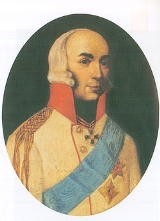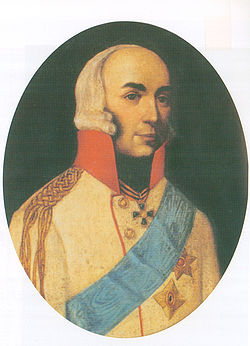
Pavel Tsitsianov
Encyclopedia

Moscow
Moscow is the capital, the most populous city, and the most populous federal subject of Russia. The city is a major political, economic, cultural, scientific, religious, financial, educational, and transportation centre of Russia and the continent...
—) was the Georgian
Georgians
The Georgians are an ethnic group that have originated in Georgia, where they constitute a majority of the population. Large Georgian communities are also present throughout Russia, European Union, United States, and South America....
Imperial Russian military commander and infantry general from 1804. A member of the noble Georgian
Georgia (country)
Georgia is a sovereign state in the Caucasus region of Eurasia. Located at the crossroads of Western Asia and Eastern Europe, it is bounded to the west by the Black Sea, to the north by Russia, to the southwest by Turkey, to the south by Armenia, and to the southeast by Azerbaijan. The capital of...
family Tsitsishvili
Tsitsishvili
The Tsitsishvili is a Georgian noble family, with several notable members from the 15th century through the 20th.The Tsitsishvili family was a continuation of the medieval house of Panaskerteli, known in the province of Upper Kartli from the 12th century, who derived their name from the castle of...
(Georgian: ციციშვილი), Tsitsianov participated in suppression of the Kościuszko Uprising
Kosciuszko Uprising
The Kościuszko Uprising was an uprising against Imperial Russia and the Kingdom of Prussia led by Tadeusz Kościuszko in Poland, Belarus and Lithuania in 1794...
and in the Russo-Persian War (1804-1813)
Russo-Persian War (1804-1813)
The 1804-1813 Russo-Persian War, one of the many wars between the Persian Empire and Imperial Russia, began like many wars as a territorial dispute. The Persian king, Fath Ali Shah Qajar, wanted to consolidate the northernmost reaches of his Qajar dynasty by securing land near the Caspian Sea's...
. In 1802 he became the head of the Russian troops in Georgia
Viceroyalty of the Caucasus
The Viceroyalty of the Caucasus is a term used to denote the Imperial Russian administrative and political authority in the Caucasus region exercised through the offices of glavnoupravlyayushchiy and namestnik...
.
Tsitsianov's rule in Georgia was characterised by his uncompromising policies towards the local peoples. He answered firmness with firmness, blood with blood, declaring that: "I tremble with eagerness to water our land with your criminal blood," and warned that order would be imposed "with bayonets and grapeshot until your blood flows in rivers". Though many resented his rule he was largely successful, upgrading the Georgian Military Road
Georgian Military Road
The Georgian Military Road is the historic name for a major route through the Caucasus from Georgia to Russia. Alternative routes across the mountains include the Ossetian Military Road and the Transkam.-Route:...
, conquering Ganja
Ganja
Ganja is Azerbaijan's second-largest city with a population of around 313,300. It was named Yelizavetpol in the Russian Empire period. The city regained its original name—Ganja—from 1920–1935 during the first part of its incorporation into the Soviet Union. However, its name was changed again and...
and subduing Shirvan
Shirvan
Shirvan , also spelled as Shirwan, Shervan, Sherwan and Šervān, is a historical region in the eastern Caucasus, known by this name in both Islamic and modern times...
.
In 1806, and with characteristic bravado, he rode up to the walls of Baku
Baku
Baku , sometimes spelled as Baki or Bakou, is the capital and largest city of Azerbaijan, as well as the largest city on the Caspian Sea and of the Caucasus region. It is located on the southern shore of the Absheron Peninsula, which projects into the Caspian Sea. The city consists of two principal...
demanding the submission of the city. Troops loyal to the Khan of Baku inside the city walls shot him dead together with his aide-de-camp, then cut off his head and both his hands. The third member of the small mission escaped to relate the gruesome tale. His head was sent to Fat′h-Ali Shah Qajar in Tehran
Tehran
Tehran , sometimes spelled Teheran, is the capital of Iran and Tehran Province. With an estimated population of 8,429,807; it is also Iran's largest urban area and city, one of the largest cities in Western Asia, and is the world's 19th largest city.In the 20th century, Tehran was subject to...
.
Mirza Mohammad Akhbari
In 1806 , Mirza Mohammad Akhbari , a teacher of Akhbari school of FiqhFiqh
Fiqh is Islamic jurisprudence. Fiqh is an expansion of the code of conduct expounded in the Quran, often supplemented by tradition and implemented by the rulings and interpretations of Islamic jurists....
(Islamic Law) in Tehran , promised Fat′h-Ali Shah Qajar to secure, by supernatural
Supernatural
The supernatural or is that which is not subject to the laws of nature, or more figuratively, that which is said to exist above and beyond nature...
means, the death of Tsitsianov, commander of the Russian forces at that time besieging Bākū.Retreating for a period of forty days to the shrine at Shah-Abdol-Azim, he began to engage in certain magical practices, such as beheading wax figures representing the Tsitsianov. It so happened that during his retreat, Tsitsianov was assassinated during negotiations at Bākū, and the severed head (or, according to some accounts, hand) of the Russian commander arrived in Tehran just before the forty days were up. Because Fat′h-Ali Shah feared that the supernatural powers of Mirza might be turned against him , he exiled him to Arab Iraq.

